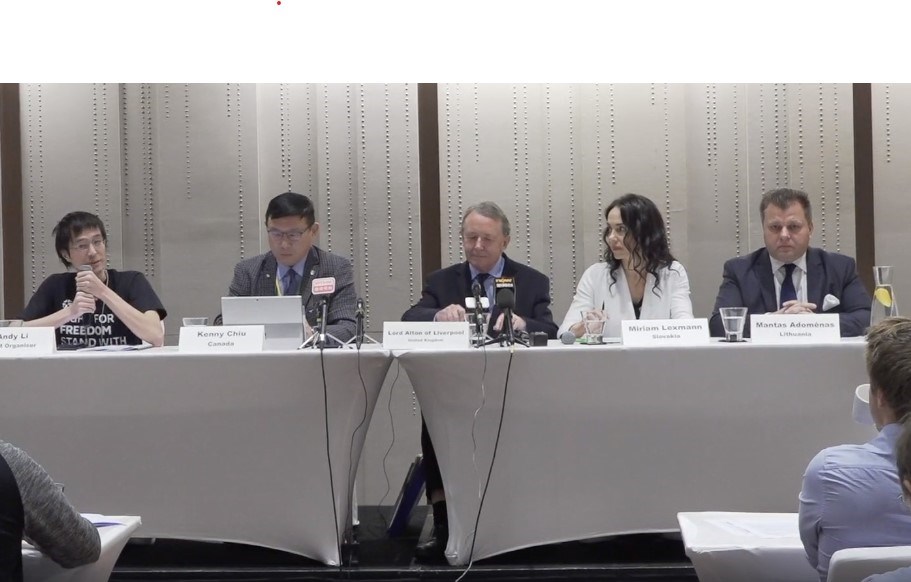It was like Hong Kongers were saying – you gave us an opportunity to exercise our democratic principles, so we will give you a respite from our protests.
For months, the Hong Kong police have been cracking down on pro-democracy protesters. But the five days Steveston-Richmond East MP Kenny Chiu was in Hong Kong – the place he was born in and where spent the first 17 years of his life – the protests were at a standstill as Hong Kongers cast ballots in district elections.
There were signs of past rioting with large areas of the airport restricted, broken traffic lights causing traffic mayhem, damage to subway stations and graffiti.
As Chiu moved through the gridlocked neighbourhood of Mong Kok, he was worried the inconvenience and disruption caused by months of rioting would result in Hong Kongers punishing the pro-democracy movement by electing pro-China candidates.
This was also the narrative coming from the pro-China media, he said.
Chiu had been invited by two election monitoring groups - Hong Kong Story and Fight for Freedom, Stand with Hong Kong - to join a group of other international parliamentarians to observe the election.
On Sunday, Chiu was at five polling stations, witnessing as voters cast their ballots in the elections that ended up tripling the number of pro-democracy representatives and sweeping 17 out of the 18 electoral districts.
“It’s ironic that the hard-line suppression in Hong Kong actually helped (the pro-democracy candidates),” he said.
Hong Kongers delivered a resounding victory to the pro-democracy candidates, showing that trying to suppress democracy with the blunt tool of police crackdowns wasn’t going to fly in Hong Kong.
“Political issues require political solutions,” Chiu said.
And, since the pro-democratic tsunami at the polls, the Chinese media has been very quiet, Chiu said, but, he added, it’s not time to be complacent.
“Democracy is not the be-all and end-all,” Chiu said, likening it to a truck that takes you somewhere. “It doesn’t guarantee you get a good government.”
As part of the election observation mission, Chiu felt the electoral process was open, fair and transparent.
“The execution of the election itself from our observation has been up to international standards,” Chiu said.
Irregularities were more around who could run, with the Hong Kong government asking people to sign a form saying they believed in the “one-China policy.”
Furthermore, when ballot boxes needed to be moved around, this was done by the Hong Kong riot police, casting doubt on how these boxes were handled.
The trust between the Hong Kong police and pro-democracy protesters is “totally destroyed,” Chiu said.
During protests in the past, the police have been there to keep order. Even during the umbrella movement five years ago, the Hong Kong police had the confidence of the protesters.
But that has changed and the Hong Kong police are seen as “the gloves of the heavy hand,” Chiu said.
“Imagine if you get arrested, assaulted, you get yelled at, you get batoned in the past six months by your police, how you would feel you go to the ballot station and you see them,” Chiu said.
One of the recommendations of the observation mission was to not have police at future elections – Chiu said the job could have been done by security guards.
During the October federal election, Chiu was inundated with Richmond residents concerned about the protests and police crackdown they saw in the media, asking him to support Hong Kong and stand up for democracy.
Because the issue was so polarizing, Chiu didn’t want to wade into it during the election, thinking it would detract from more important Canadian issues.
And, he didn’t feel as a Canadian, he could criticize Chinese policies when the Canadian prime minister had been pressuring his own attorney general to allow a criminal case against SNC-Lavalin to be changed to plea bargain.
Ties between Canada and the Chinese are long and complicated.
Chiu acknowledged that Canada has to strike a balance between growing its economy, which means doing business with China, all the while standing up for democratic principles.
But, in Hong Kong, he did share Canada’s experience with Quebec – having a party, the Bloc Quebecois that advocates separation from Canada – and how Canada hasn’t taken a hard line, rather recognized that it’s a nation within a nation and engaged with Quebeckers.
Chiu said he still has “shallow roots” in Hong Kong with family and friends there and the ability to watch and understand Chinese media, and he thinks this perspective helped the observation mission.



